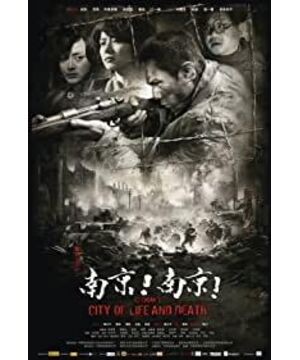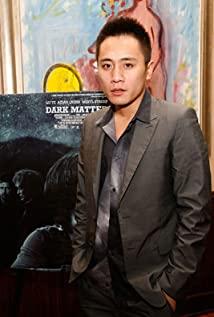I have never heard of "Nanjing! Nanjing! "I have high expectations, I think this will be a film that will not receive much attention, it will be released silently, and it will leave silently, just like many domestic films. I felt the need to watch it because after seeing the trailer flower, I found that it had a sense of realism rarely seen in domestic films, a documentary-like texture, so I understood what Lu Chuan wanted to do. Without listening to his interviews, I think what I saw myself would be more true than what he told the media.
Whether it is true or not is the most important criterion for me to evaluate this film, even the only criterion.
After watching the movie, everyone in the cinema left in silence. No one talks about the plot, no one laughs, and some people just sit there all the time. It's not easy for a movie to do this today.
Back home, read online reviews of the movie. However, I saw a lot of negative comments, mostly from a technical point of view, such as thinking that the artistry is not as good as "The Devil's Coming", the script is not good, such as using blood and nudity as a selling point, scaring children. Under these comments, there are often angry counterattacks. The defenders of this film have no big reason or theory, they just feel shocked.
A film like Nanjing should be regarded as a historical film. The most important thing about historical films, I think, is the truth. As long as it is true, other themes, techniques, plots, performances... should be forgotten by the audience. Although the realism of the film is created by these, if the audience is arguing about these after watching, the film has failed.
See the history clearly, this is a sentence that will be mentioned in many theme films. But very little is really done. I remember when I was in elementary school or middle school, the school organized to watch a movie called "Certificate of Blood in the Massacre". After watching it, the sentence everyone in the class would shout was not "don't forget the national shame", but "flower girl's." To this day, when I recall this movie, I can't remember any other scenes or plots, but the first scene that reminds me of the scene where the woman's clothes are pulled up to her chest, and this scene has appeared several times, my country's film censorship and no grading system is really Great, allowing kids to see things that many foreign kids can't, and in exchange they can't see some of the things that foreign kids can. After watching that movie, I even thought, Slaughtering the city seems to be a very cool thing. This is what a bad movie teaches us. Today, when our educators angrily criticize the online psychopaths who love slaughtering cities and the angry youths who slaughter Tokyo with blood, it's really cool to think about who taught us about war.
I am absolutely human, and very patriotic. I am sometimes elite and sometimes angry with the youth, but most of the time I am just an ordinary person, with the same likes and dislikes as the general public. But I just can't be moved by a movie like "Blood in the City". I know about the Nanjing Massacre, the Yuanmingyuan, and the Sino-Japanese War. I was deeply ashamed. I didn't understand why hundreds of thousands of people did not dare to resist a few Japanese soldiers. I also fantasized about the occupation of Tokyo one day. But after many years, I will think about other questions: If you were a civilian in Nanjing at that time, would you rush to face the bayonet? Or also become one of those who are driven out? If I were a soldier who rushed into the city of Tokyo without discipline and even gave orders to kill, would I do the same thing that the Japanese soldiers did?
Human nature may not be able to withstand torture, which is completely beyond the scope of movie reviews. But that's what I thought after watching "Nanjing Nanjing", at least it shows that it is much more successful than a movie like "Massacre of the City".
Most people will be silent after watching this movie and leave silently. They will not shout the slogan "China will not die", nor will they laugh and say that this is really a bad movie, they are just silent.
In today's movies, it is not easy to let people leave silently.
This doesn't mean Lu Chuan or how great the movie is already. Because this kind of shock comes more from history itself. Whoever restores this history to a more real life can shock people's hearts. Lu Chuan was just the first person who thought of doing so. Standing on the shoulders of history, doing nothing is the greatest contribution. Don't smear and paint the script and study the characters carefully. I would rather that Lu Chuan was not a filmmaker, rather that it was a documentary. The invisible camera takes us back to the past, to see every corner of the city and every face at every moment. How timid the people at that time were, let them be as timid as they were, and let them do anything to survive at that time. Don't deliberately create bravery and tragic, and don't deliberately cry tragic and bloody, any artificial processing is the stifling of history.
Lu Chuan has worked hard, of course, this must be far from the truth.
Maybe there are some truths that the audience and the director are unwilling to face. Maybe some truth, long forgotten with the dead.
Forgetting is a good thing. Although faced with parting from life and death, even though we have been mourning and weeping, people always have to laugh, and they always prefer to hide the pain deep in their hearts, rather than dig it out and face it again and again. There are too many films in Nanjing now. I am not worried that people will forget history, but I am worried that people will become numb after watching too many sufferings and sorrows. There will always be people who want to think about rape scenes, and there will always be people who choose to change channels when they see Mo Wang's national humiliation. This is human nature. It is the human nature of ordinary people, we are just like this, we are not noble, not even kind, divinity and animal nature are in one thought, a slaughtered person, change the scene, give him a gun, give him a chance to indulge his desires , may become a murderer.
The significance of "Nanjing Nanjing" is that it tells us what we have known for a long time.
First, many of these people died.
Second, the people who killed them were like this.
Third, the massacre, that's what it is.
A bad film will insult history, a good film will make people understand history. History has never changed. It's just been turned upside down in the hands of different people. We can only choose the one that seems the most sincere to believe, at least, currently Lu Chuan is. So many movies describe massacres and rapes, but Nanjing Nanjing makes me not think: "That corpse seemed to laugh just now" or "This guy playing the Japanese army is cool this time." I would really feel like these people were dead, and I would begin to understand the numbness, the despair and the anger, and I would really feel the tremors. Not because of Lu Chuan, but because of the power of history itself.
So, I couldn't be touched by this kind of film before, it's not the problem of people like me, it's the problem of the people who make the film.
"Nanjing Nanjing" may not be that good, it's just better than most scumbags.
Nanjing Nanjing is not without pretense. Can we let the Japanese army commit suicide or kill a holy beauty because of guilt? These episodes have been used in "Blood Evidence of the Massacre" and "Mei Lanfang". Is it real? If not, please delete this scene. The thugs wouldn't really be ashamed to commit suicide by seeing this episode.
When I wrote this, the music I heard was Kitaro's "heaven & earth". This is a marching song. The long Sengoku horn echoes. You can imagine that thousands of Japanese samurai are raising their flags.
Really good music, just like the Japanese spirit in the movie. The stronger the drum sound, the more our hearts tremble. There is no need to hide our heart palpitations, because there has never been a warrior who is not afraid of death. It is a machine who is not afraid of death. It is a warrior who is afraid of death but will still move forward.
I used to think that the Chinese were cowardly and allowed to be slaughtered, but then I realized that every person who died once worked hard to survive. China has never been ischemic, and there is greatness and sacrifice. Therefore, there is no need to make up history, no need to deliberately beautify or vilify anyone, no need to fabricate any plot, or even the courage to face history, how can there be brave Chinese people?
View more about City of Life and Death reviews











